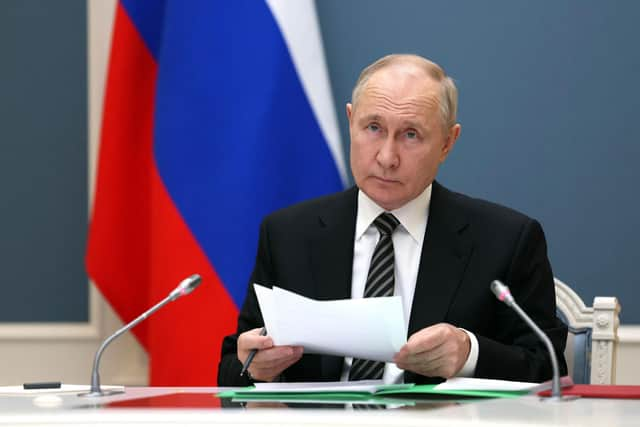World ahead: Will 2024 see the end of any of the conflicts raging around the world?


Each year, it feels like predicting world events in the twelve months to come is an increasingly difficult task.
After coming out of the Covid pandemic, hopes for a happier and less dramatic time to come were dashed as we faced major wars being waged across the globe, as well as the fallout from an increasing number of natural disasters linked to climate change.
Advertisement
Hide AdAdvertisement
Hide AdThe United Nations’ refugee agency, UNHCR, says 112 million people across the world are currently displaced from their homes due to conflicts, persecution and events such as earthquakes and floods.


A number of countries, including Afghanistan, Syria and Turkey, are still dealing with the aftermath of major earthquakes, which destroyed properties and killed tens of thousands of people.
Meanwhile, the Russian invasion of Ukraine continues, but threatens to fall out of the news agenda as the situation in Gaza following the 7 October Hamas attacks and the ensuing Israeli bombardment of the Palestinian territory worsens.
The humanitarian situation is at a critical juncture as the vast majority of Gazans are forced out of their homes due to Israeli evacuation orders – and aid agencies warn that civil order is breaking down, amid a drastic shortage of food, medical care and even shelter.
In Sudan, where civil war broke out in April after tensions between army chief General Abdel Fattah al-Burhan and General Mohammed Hamdan Dagalo, commander of the paramilitary force known as the Rapid Support Forces (RSF), escalated into full scale conflict, seven million people have become refugees. More than 12,000 people have been killed in the conflict over the past eight months, with little sign of resolution, particularly after mediation attempts by African regional body the Intergovernmental Authority on Development (IGAD) were dismissed by both sides in December.
Both Russia and Ukraine are also due to have presidential elections this year – although one of them looks unlikely to do so.
Ukraine, which has been under martial law since Russia’s invasion in February 2022, would require an amendment to the law to go ahead with a scheduled election in March. Under martial law, the existing government can remain in place for as long as the country is on a war footing - and the general election last year was postponed.
President Volodymyr Zelensky has suggested the election is not likely to be held. In November, he said "now is not the right time for elections" and asked the Parliament to approve an extension of martial law for another 90 days, until 14 February. A poll released that same month reported that 80 per cent of Ukrainians do not want to have an election until the war is over.
Advertisement
Hide AdAdvertisement
Hide AdSome international observers, particularly in the US, have pushed for Ukraine to go through with the election in a bid to uphold democracy. However, Mr Zelensky and his supporters have pointed to problems such as air raids disturbing voting in some areas and issues for soldiers fighting on the frontline being able to access ballot boxes.
In Russia, president Vladimir Putin will stand for another term in the March vote, which could see him remain in power until 2030. He is expected to win around 80 per cent of the vote in an election which has been said to have little credible opposition.
However, questions have been raised over Mr Putin’s health, with some conspiracy theories claiming that he died of a heart attack in October and that all public appearances since have been body doubles. If there is any truth in these theories, his body doubles are presumably bracing themselves for a busy presidential campaign.
Not to be forgotten is the November US presidential election, which, as always, has already been trailed for months.
It still looks set to be a fight between current Democrat president Joe Biden, 80 and former president, Republican Donald Trump, 77, who is currently battling a string of court cases, but has nevertheless vowed to stand.
Mr Biden said recently that he may not have considered standing for re-election if Mr Trump had not opted to do so.
At the turn of the year, the BRICS group of countries of emerging economies - an informal alliance among Brazil, Russia, India, China, and South Africa - is to add Argentina, Egypt, Ethiopia, Iran, Saudi Arabia, and UAE to its ranks.
The move is seen as a strengthening of countries in the region in a show of power against Western allegiances such as the G20 – in a shift away from the current world order.
Advertisement
Hide AdAdvertisement
Hide AdOn a more cheerful note, 2024 is a leap year. The Texan town of Anthony claims to be the Leap Year Capital of the World, attracting Leap Year babies to a four-yearly parade. The event was started in 1988 by local resident Mary Ann Brown and her neighbour Birdie Lewis, both born on a leap day, who approached the Chamber of Commerce with the idea of a leap year festival and a leap year birthday club for those born on a leap day.
This year’s festival will be a three day extravaganza, however, this will be the first celebration without Ms Brown, who died in 2021, aged 89.
In Indonesia, a brand new city is due to be inaugurated as the capital on 17 August, coinciding with Indonesian Independence Day. Nusantara, meaning “archipelago” in ancient Javanese, will replace Jakarta as the national capital, a position the latter city has held since the country's independence in 1945. However, Jakarta – 800 miles from the newly-constructed Nusantara, which is located on Borneo - has been sinking, with 40 per cent of the Indonesian capital now estimated to lie below sea level.
The change will mark the end of a 10-year term in office for president Joko Widodo, who hopes to leave behind a legacy of a green metropolis run on renewable energy. However, reports have claimed that few buildings are yet finished, meaning it will be nail biting few months for Indonesian construction workers.
As long as everything goes according to schedule, in November, four astronauts will travel around the Moon on Artemis II, the first crewed mission on NASA's path to establishing a long-term presence at the Moon for science and exploration.
The flight will be the second crewed mission of the Artemis program and first crewed mission beyond low Earth orbit since 1972. It will also pave the way to land the first woman on the Moon on Artemis III.
Comments
Want to join the conversation? Please or to comment on this article.
